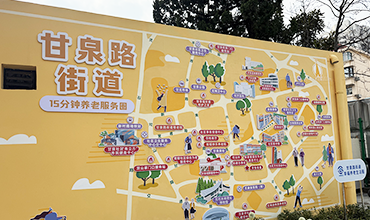


“Addressing healthcare challenges for the elderly and strengthening the life service network, a fulfilling senior life is within reach.”
Aging has become a more pressing issue for Shanghai, the first city in China to enter an aging society. According to data released by Shanghai's civil affairs department, by the end of 2023, the city's registered population aged 60 and above had reached 5.6805 million, accounting for 37.4% of the total population. Among them, 816,400 were aged 80 and above, making up 5.4% of the total.
The 2025 Government Work Report explicitly calls for "Strengthening inclusive, fundamental, and bottom-line social welfare services," listing elderly care as a key priority. It emphasizes the need to actively address population aging by improving policies and mechanisms for elderly care services and industries while vigorously developing the "silver-hair-economy."
In recent years, whether at the national or Shanghai-level political meetings, "elderly care" has been a frequent topic of discussion among representatives and policymakers. To proactively respond to aging challenges, Shanghai has taken early and rapid action. Since early 2025 alone, multiple government departments, including civil affairs and health, have successively introduced policies such as "home meal delivery for the elderly," "medical assistance and escort services," and "care services for unaccompanied seniors" to tackle key issues affecting elderly people’s daily lives and medical needs.
Focusing on the urgent concerns of the elderly, Shanghai has continuously expanded its services—from medical assistance and bathing support to meal delivery. The city has also established a "15-minute elderly care service circle," promoted home modifications for aging-friendly living, and advanced smart elderly care initiatives. Beyond physical care, it has enriched the spiritual and social lives of the elderly, creating a model for elderly care in a megacity and striving to realize the vision of "aging with dignity and well-being."
Addressing Healthcare Challenges for the Elderly
When it comes to elderly care, health is the priority, and accessing medical services has long been a major challenge for seniors. During the 2025 National People’s Congress, Zhou YanFang, a National People's Congress representative and director of China Pacific Insurance's Strategic Research Center (ESG Office), addressed the pressing medical difficulties faced by elderly care in megacities. She highlighted common issues: some elderly individuals struggle with online appointment systems, face difficulties communicating their medical conditions alone, or have no one to accompany them during hospital stays. For empty-nest seniors, the biggest fear is falling at home with no one to help.
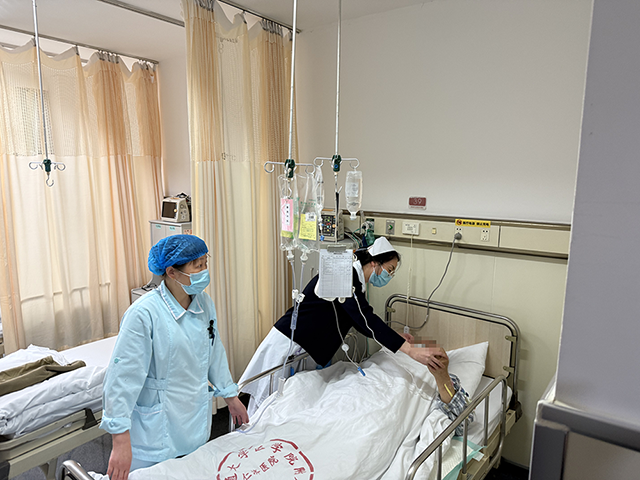
In the pilot ward of the "Unaccompanied Care Ward" at Shanghai Renji Hospital, a nurse and a caregiver are attending to a patient. (Paper.cn/Sisi Chen)
To address these challenges, Shanghai has already taken exploratory steps. In 2022, the Thoracic Surgery and Urology departments at Shanghai Renji Hospital piloted the "Unaccompanied Care Service." Mr. Li, a lung cancer patient, opted for the unaccompanied care ward in the Thoracic Surgery Department, as his elderly wife was frail and his children lived abroad. With round-the-clock care from nurses and caregivers, he was able to recover quickly. "This service is excellent," he said. "It spares my family the trouble, and the ward remains quiet, allowing me to rest well both day and night."
By 2025, the coverage of "Unaccompanied Care Services" will expand further across Shanghai. During the National People's Congress this year, the Shanghai Municipal Health Commission issued a directive stating that by the end of May 2025, all tertiary hospitals (those with intensive care units) at both the municipal and district levels must implement pilot programs for "Unaccompanied Care Services." Other public medical institutions that wish to participate in the initial pilot phase may also do so voluntarily.
At the same time, Shanghai is also focusing on addressing medical care difficulties for elderly individuals, particularly those who are very old or live alone, by exploring new initiatives in medical assistance and escort services.

The Medical Escort Service Process in the "Yangpu District Flagship Store" on Suishenban:Before the Escort, During the Escort, After the Escort. (Paper.cn/Sisi Chen)
At the same time, Shanghai is also focusing on addressing medical care difficulties for elderly individuals, particularly those who are very old or live alone, by exploring new initiatives in medical assistance and escort services.
In January 2025, the Shanghai Elderly Medical Escort Service Pilot Program was launched, announcing trial operations in nine districts, including Yangpu and Putuo. In November 2024, Yangpu District issued its first 128 certifications for "Shanghai Elderly Care Service Escort Specialists." Some services have already been rolled out, while pilot districts are refining their implementation plans.
"Since the launch of the elderly medical escort pilot program, inquiries about obtaining escort specialist certification and participating in these services have increased daily, reflecting significant market demand," said Wang Jue, a member of the National Committee of the Chinese People's Political Consultative Conference (CPPCC) and Deputy Mayor of Putuo District, Shanghai. Putuo District, in collaboration with Shanghai Open University, is currently organizing escort specialist training programs, aiming to train and certify at least 100 specialists by the end of the year. Wang highlighted that escort services improve the efficiency of medical resources, reduce the burden on families, and create employment opportunities.
Strengthening the Life Service Network
Elderly care services range from a single nursing home bed to an entire service network, demonstrating the warmth of elderly care in a megacity.
For 27 consecutive years, Shanghai has included nursing home bed expansion in its key government projects. Currently, the city has 176,000 nursing home beds, and efforts are ongoing to deepen community-based embedded elderly care services.
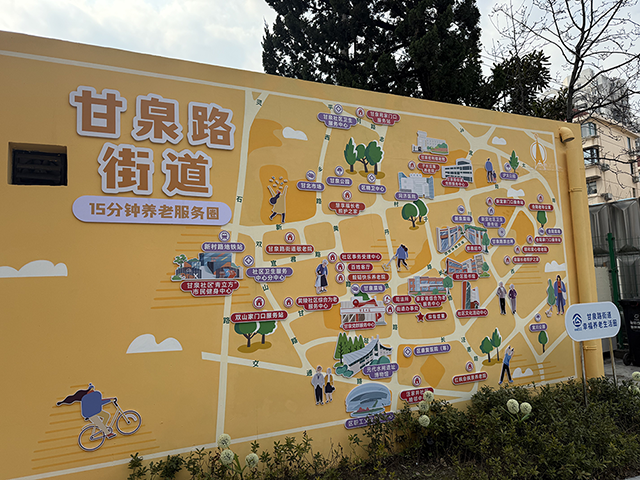
The "15-Minute Elderly Care Service Circle" in Ganquan Road Subdistrict, Putuo District. (Paper.cn/Sisi Chen)
Of the 28 million visitors, mainland Chinese tourists accounted for 19.05 million, comprising 67.5% of all arrivals. Notably, 9.31 million visitors came from the nine cities of the Greater Bay Area’s Pearl River Delta, marking a 1.8-fold increase. Additionally, visitors from Hong Kong and international markets reached 7.2 million and 1.46 million, accounting for 25.5% and 5.2% of total arrivals, with year-on-year increases of 13-fold and 105.9%, respectively.
In Zhangjia Alley Community, located in Ganquan Subdistrict, Putuo District, Shanghai, residents aged 60 and above account for more than 50% of the registered population. Within their own community, seniors can access a variety of elderly care services without leaving the neighborhood, including daycare services, senior meal programs, rehabilitation exercises, and assisted bathing services provided by elderly care institutions.
Meanwhile, at the Community Comprehensive Elderly Service Center in Wujiaochang Subdistrict, Yangpu District, a shared community space has been established, offering daycare services, cultural activities, book clubs, social gatherings, and government services for seniors. From residential communities to subdistricts, Shanghai is strengthening its elderly care service network right at residents’ doorsteps, actively building a "15-Minute Elderly Care Service Circle."
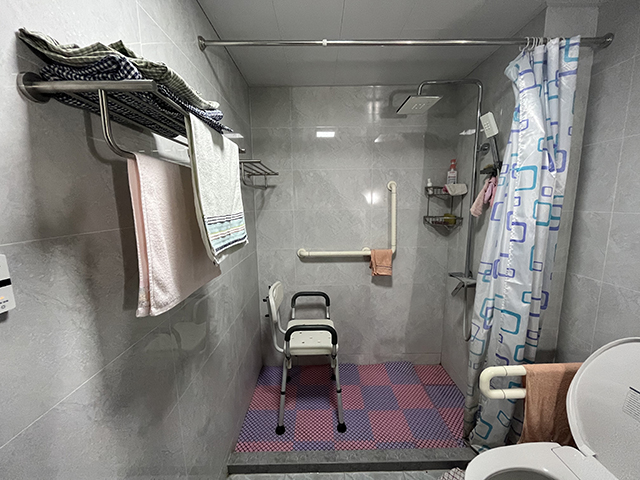
In the age-friendly renovated bathroom, seniors can bathe while seated for improved safety and comfort. (Paper.cn/Juan Zou)
Meanwhile, at the Community Comprehensive Elderly Service Center in Wujiaochang Subdistrict, Yangpu District, a shared community space has been established, offering daycare services, cultural activities, book clubs, social gatherings, and government services for seniors. From residential communities to subdistricts, Shanghai is strengthening its elderly care service network right at residents’ doorsteps, actively building a "15-Minute Elderly Care Service Circle."
A comprehensive elderly care network is about addressing every detail of Senior Living. Shanghai is committed to enhancing elderly care services by addressing every aspect of senior living, from housing and dining to healthcare and entertainment.
To ensure safe and comfortable living environments, Shanghai has been actively promoting home modifications for aging residents. Measures such as installing handrails, using non-slip flooring, and converting bathtubs into showers help create a secure and accessible home for seniors. To make dining more convenient, the city has established over 400 community senior meal centers and introduced local standards for affordable and accessible meal services.
For chronic disease management, Shanghai has expanded the family doctor contract system, with over 80% of elderly residents now covered by community healthcare services. Addressing the burden of caregiving for disabled seniors, Shanghai has piloted a long-term care insurance system, reducing costs for elderly individuals in need and fostering the growth of professional caregiving institutions. To support dementia care, the city is developing dementia-friendly communities and upgrading care facilities to accommodate seniors with moderate to severe cognitive impairments.
These senior-friendly initiatives continue to evolve and expand. For instance, Shanghai plans to establish 30 more community meal centers in 2025, along with upgrading its elderly meal delivery services.
This initiative has already taken exploratory steps. Putuo District’s Smart Elderly Meal Service Management Platform has gone live, allowing seniors to place meal orders via mobile phones, while community meal centers automatically receive and distribute orders based on data linkages. “This system not only expands the service coverage from a few hundred meters to several square kilometers but also ensures that seniors can still access meals during extreme weather conditions,” said Wang Jue, Deputy Mayor of Putuo District.
A Promising Future for "Enjoyable Aging"
Beyond basic needs like food, clothing, and housing, enriching the spiritual and cultural lives of seniors is also a growing focus. With the aging population driving demand in the Silver-Hair-Economy, Shanghai is actively supporting new business models in the elderly care sector.
Efforts include: Integrating culture, commerce, and tourism to promote senior-friendly cruise tourism. Encouraging the development of immersive cultural and entertainment spaces tailored for seniors. Expanding barrier-free travel services, such as stair-climbing assistance, and incorporating them into government procurement programs.
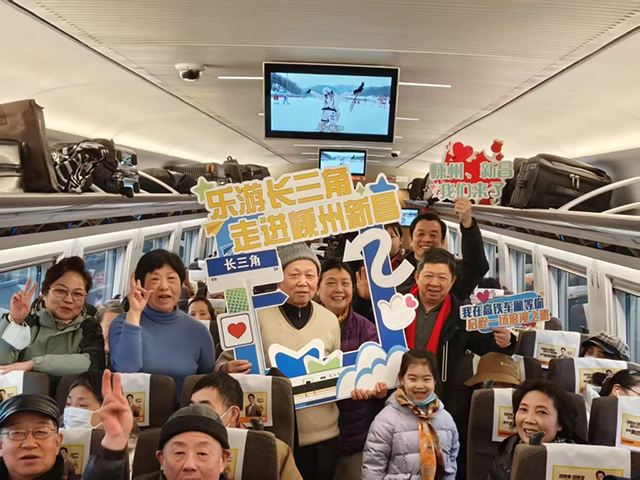
The first "Leisure Tour of the Yangtze River Delta" silver-age tourism train of the year departed from Shanghai. (Paper.cn/Wenfeng Xu)
On February 14, 2025, the first "Leisure Tour of the Yangtze River Delta" silver-age tourism train of the year departed from Shanghai Hongqiao Railway Station, traveling along the Hangzhou-Taiwan High-Speed Railway to Shengzhou and Xinchang. This three-day, two-night weekend getaway, themed "Taking the High-Speed Rail Through the Poetry Road," marks the beginning of the spring season’s senior-friendly travel offerings. Over ten additional premium travel packages designed for elderly tourists will be launched, enhancing travel experiences for senior passengers.
To boost the silver-hair-economy, Shanghai released the "Several Policy Measures for the High-Quality Development of the Silver Hair Economy" at the end of 2024. The document outlines clear directions and strategies, focusing on accelerating the growth of key industries, expanding market participants in the elderly care sector, enhancing resource allocation, creating a favorable business environment.
Shanghai is also actively developing silver-hair-economy industrial parks. In eastern Shanghai, the Shanghai Rehabilitation Assistive Devices Pudong Zhangjiang Park leverages AI and biomedicine to drive interdisciplinary innovation in rehabilitation equipment. In western Shanghai: The Shanghai Rehabilitation Assistive Devices Industrial Park and Qingpu Xihongqiao Park aim to attract corporate headquarters from the Yangtze River Delta and establish trade and exhibition platforms. In southern Shanghai: The Shanghai Elderly Care Technology Industrial Park in Lingang Zero Bay focuses on elderly care technology, a key driver of the silver-hair-economy.
Advancements in emerging technologies are accelerating the digitalization of elderly care services. From wearable health monitoring devices to exoskeleton robots and smart systems, intelligent elderly care is emerging as a new growth sector in the silver-hair-economy.
During the National People's Congress, Zhou Yanfang emphasized the need to expand the market for senior-focused smart devices, including Smart glasses, Hearing aids, Mobility aids, Smart mattresses, Fall-prevention monitors and Rehabilitation and caregiving robots
Meanwhile, Fan Xianqun, an academician of the Chinese Academy of Engineering and Dean of Shanghai Jiao Tong University School of Medicine, recommended promoting wearable devices and intelligent health management systems. He called for policy support and financial subsidies to encourage companies to develop and market AI-powered health management wearables that provide real-time health monitoring and personalized recommendations.
In Shanghai, the concept of elderly care is evolving into "enjoyable aging," with a future filled with greater comfort, independence, and opportunities for seniors. The silver-hair-economy is rapidly expanding, driven by technological innovation, policy support, and a growing demand for high-quality senior services.